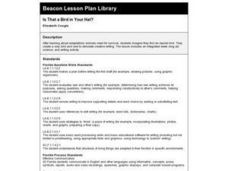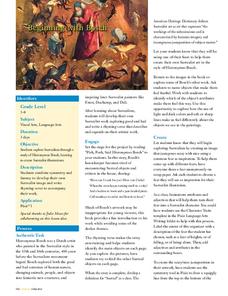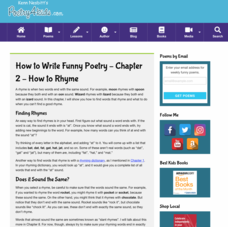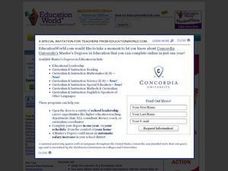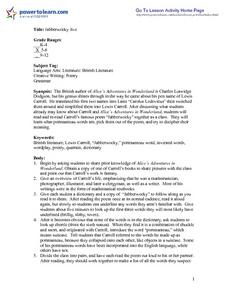Curated OER
Morphemic Analysis
Students analyze content area vocabulary. In this content area literacy instructional activity, students list math words they are unfamiliar with and identify morphemes found in those words that are found in other words. Once they have a...
Curated OER
Increasing Vocabulary Skills
Young scholars explore new words through the reading of The Hobbit by J.R.R. Tolkien. In this literature lesson, students write down the words that they do not know as they read the book. Young scholars look up the words in the...
Curated OER
You Wouldn't Understand...It's a Slang Thang
Fourth graders study a decade in history through its slang. They analyze a slang dictionary from the 1920's and read a primary source letter making use of the slang. They decipher the language and compare and contrast 1920's language...
Curated OER
Is That a Bird in Your Hat?
Second graders imagine they find an injured bird. They create a clay bird and nest to stimulate creative writing. The lesson includes an integrated week-long art, science, and writing activity.
Curated OER
Haunting Music
Students discover music that was inspired by the spooky and bizarre. In this music of Hector Berlioz and Camille Saint-Saens activity, students identify elements of music and listen to the Symphonie Fantastique and Danse Macabre....
Curated OER
Memorandum Regarding the Enlistment of Navajo Indians
Young scholars examine the Navajo dictionary used by the U.S. military in W.W. II. They role-play Navajo messengers and Marine Corp staff. They research the Battle of Iwo Jima and confirm or discount the claim that Navajos made the...
Curated OER
How the Environment Affects Our Health
Ninth graders explore how the environment affects health. In this infectious disease lesson, 9th graders investigate what environmental situations cause infections diseases. Students study the symptoms, treatments, prevention, and...
Curated OER
The Changing Me
Third graders study the human body. In this health lesson, 3rd graders discuss that everyone's body is growing, measure body parts using a tape measure, and color the body worksheet.
Curated OER
Civil War Letters
Students put themselves in the shoes of American Civil War soldiers. In this Civil War lesson, students examine letters from the time period written by soldiers, edit the letters for grammatical errors, and then present the letters to...
Curated OER
Deep Roots of Ancient Greece
Young scholars investigate Greek contributions to modern America. In this ancient Greek influence lesson, students watch videos, listen to lectures, and conduct research regarding ancient Greek ideals in order to analyze and trace Greek...
Curated OER
Boston Women: The Struggle for Freedom 1760 -1850
Fifth graders investigate the lives and various accomplishments of selected women of Boston.In this famous women writing lesson, 5th graders research biographical information. Students discuss the achievements of these women using...
Curated OER
Beginning with Bosch
Students become familiar with surrealism through the artwork of Hieronymus Bosch. For this Bosch lesson, students explore symmetry and surrealism. Students create step by drawings on the computer in the style of Hieronymus Bosch....
Curated OER
Dead Word Wall Kills Overused Words
Have your class attend a funeral for the words they overuse in their writing. They develop a list of alternate words for those overused words, and make an effort to employ alternatives whenever possible. This is a great way to improve...
Media Smarts
Defining Popular Culture
What part does media play in creating, defining, and perpetuating popular culture? High schoolers chart their encounters with fads, trends, and icons and reflect on the media's influence on popular culture.
Poetry4kids
How to Write Funny Poetry — Chapter 2: How to Rhyme
Funny poems don't have to rhyme—but it helps! Learn how to use rhyming words to add humor to funny, clever, or just plain silly poems.
Poetry4kids
How to Write Funny Poetry — Chapter 1: Writing Poetry
Do you wish you could write poetry that makes people laugh? Now you can! Check out the first chapter in a poetry writing series that emphasizes the importance of connecting subject matter to a light, bouncy meter.
Curated OER
Sonnet Explication
Learners analyze close readings of poems, looking up words in the dictionary, and discussing the major parts of dictionary definitions, including word origin and parts of speech. They examine sonnets, then compare/contrast their findings.
Curated OER
Brain Break: Vocabulary and Context Clues
Young scholars utilize various sources to build and refine their vocabulary skills. They work together to solve a crypto-quote and daily puzzle from the newspaper.
Curated OER
Math Prefixes
Young scholars use a dictionary to gather appropriate information for writing simple definitions. They recognize prefixes that relate to numbers, such as mono-, bi-, and tri-. Pupils use their creative abilities to extrapolate new words...
One Stop English
Brexit
Brexit. Eurosceptics. Titanorak. Frankenstorm. Check out a neat worksheet and the attached article. It's all about buzzwords and how they are birthed. Whoda thunkit.
Curated OER
Clown or Comedian
Pupils discover how to compare and contrast the differences between a clown and a comedian. They use dictionaries to expand their vocabulary.
Curated OER
Give My Regards to Broadway
Learners investigate aspects of Broadway shows. They apply word attack skills to decide what the titles of actual Broadway shows mean. They discuss the history of Broadway shows and why they become successful before completing the...
Curated OER
Re-Name That Tune: A Vocabulary Activity
Students build vocabulary skills by rewriting the names of some popular holiday songs, and create a fun "Holiday Tune" bulletin board display.
Curated OER
"Jabberwocky" Jive
Pupils review the fantasy of Alice in Wonderland and discuss the author. After reading the poem, "Jabberwocky," they look up unfamiliar words in the dictionary. Working as partners, they create a list of "protmanteau" or invented words...





